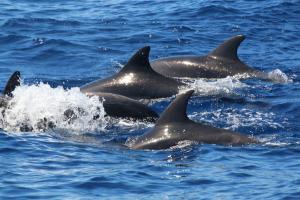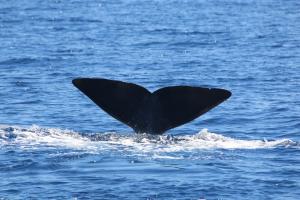The Tursiops association has made 33 sightings of cetaceans in the north of Menorca.
The Tursiops association has made 33 sightings of cetaceans, including 20 sperm whales, in the north of Menorca. These data are the result of the study carried out as part of the Moby Mummy project, which seeks to confirm cetacean breeding areas on the Balearic island, as well as to better understand their movements in order to contribute to their preservation.
This third edition of the project has been supported by Menorca Preservation and the Ocean Born Foundation, an organisation that aims to create new sources of income to combat climate change by focusing on the health of the oceans; s’Ajuntament de Maò; the Consell Insular de Menorca; the Fundació Marilles and the Banco Santander Foundation.

For this Moby Mummy 2021 campaign, the Tursiops research vessel, the sailing boat Irifi, covered a total of 840 miles in search and monitoring of sperm whales in the waters off the north of Menorca.
Despite the fact that the expedition has faced adverse weather conditions and also military sonar, which in itself scares off the presence of cetaceans, in just four days of sightings the team was able to observe a total of three social groups of sperm whales, totalling 20 individuals, three of which were calves.
However, the appearance of these sperm whales for the third consecutive year not only shows the high presence of these wonderful animals, but also adds value to the area sampled, since, apart from this species, groups of striped dolphins have been sighted on 11 occasions, which have reached a size of up to 100 individuals.
Bottlenose dolphins, which are more coastal and therefore located in an area with less sampling effort, have been identified on three occasions, totalling 24 individuals. The Risso’s pilot whale has been sighted up to four times, totalling more than 60 individuals. In addition to these cetaceans, a total of nine loggerhead turtles and eight manta rays have also been sighted.

Carolina Manhusen Schwab, president of the Ocean Born Foundation, said: “Thanks to the research carried out by Tursiops, it has been demonstrated that the area in question is indeed a nursery for Mediterranean sperm whales, as social groups with calves have been found. This information is of fundamental importance to understand what is happening in these waters, and therefore the importance of being certified as a nursery area. Only with this certification will we be able to protect the marine life that resides in the north of Menorca”.
For his part, Txema Brotons, Founder and Scientific Director of Tursiops commented that “after three campaigns in the north of Menorca, the data obtained indicate that we are in an area that could be key for the population of the Mediterranean sperm whale. During these surveys, a high presence of the species has been observed in the area, with encounter rates that far exceed those found around the Balearic Islands, despite the fact that these have already been identified as a prime enclave for this population. Moreover, during these years only social groups have been sighted, i.e. females with sub-adults and young, and the percentage of the latter suggest that the area is being used as a nursery. Work towards their protection is urgently needed”.